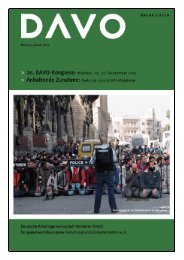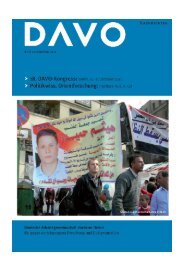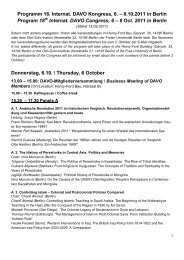4 Dissertationen und Habilita- tionen / Dissertations and Habilitations
4 Dissertationen und Habilita- tionen / Dissertations and Habilitations
4 Dissertationen und Habilita- tionen / Dissertations and Habilitations
Erfolgreiche ePaper selbst erstellen
Machen Sie aus Ihren PDF Publikationen ein blätterbares Flipbook mit unserer einzigartigen Google optimierten e-Paper Software.
VORTRÄGE 18. DAVO-KONGRESS PAPERS DAVO CONGRESS 2011<br />
logischen Bedeutung hat der Umfang der Feierlichkeiten<br />
in den vergangenen Jahren hier jedoch deutlich<br />
abgenommen: Zu ökonomischen Gründen kommen<br />
Abw<strong>and</strong>erung <strong>und</strong> Entfremdung der jüngeren Generation<br />
vom L<strong>and</strong>leben. Die unter Muslimen in Deutschl<strong>and</strong><br />
sehr populäre Möglichkeit, per Geldüberweisung<br />
über Hilfsorganisa<strong>tionen</strong> ein Opfertier zu spenden,<br />
stellt allerdings keine Alternative dar: Ritualgemeinschaft,<br />
Bezugspunkt des Festes <strong>und</strong> Ort der Kommensalität<br />
ist die von Verw<strong>and</strong>tschaft <strong>und</strong> reziproken<br />
Beziehungen geprägte Dorfgemeinschaft.<br />
Während das Opfer im Zuge umfassenden Strukturw<strong>and</strong>els<br />
an realem Stellenwert verliert, spielen <strong>and</strong>ere<br />
religiöse Praktiken der Wohltätigkeit im Dorfalltag<br />
eine zentrale Rolle. Unter der alternden Dorfbevölkerung<br />
ist der soziale Umgang mit Todesfällen ein<br />
wichtiges Thema. Neben der Bestattung finden weitere<br />
rituelle Versammlungen statt, bei denen für den<br />
Verstorbenen Koran rezitiert <strong>und</strong> gebetet wird. Indem<br />
die Teilnehmenden religiöses Verdienst (ṯawāb) für<br />
den Toten sammeln <strong>und</strong> zugleich von den Hinterbliebenen<br />
bewirtet werden, investiert man in ein das diesseitige<br />
Leben transzendierendes System der Reziprozität<br />
<strong>und</strong> Absicherung.<br />
Silvia Martens: Motive für wohltätiges Engagement<br />
von Muslimen in der Schweiz<br />
Der Vortrag stellt Teilergebnisse eines Forschungsprojektes<br />
zum wohltätigen Engagement von Muslimen<br />
in der Schweiz vor. Die in der Studie befragten<br />
Muslime zeichnen sich durch ein vielseitiges Engagement<br />
aus. Sowohl auf Ebene der organisierten<br />
Wohltätigkeit als auch auf Ebene informeller Netzwerke<br />
erbringen sie verschiedene Spenden in Form<br />
von Geld, Naturalien <strong>und</strong> gegebener Zeit. Dieses Engagement<br />
wird zum Teil von den Befragten explizit<br />
mit religiösen Begriffen (zakat <strong>und</strong> sadaqa) bezeichnet<br />
oder ist oft implizit an religiöse Tradi<strong>tionen</strong> geb<strong>und</strong>en,<br />
was etwa durch Zeitpunkt, Umfang oder Art<br />
der Spende zum Ausdruck kommt.<br />
Wie die Autorin in diesem Vortrag argumentiert,<br />
lassen sich die Beweggründe für wohltätiges Engagement<br />
jedoch keinesfalls auf religiöse Motive beschränken.<br />
Vielmehr liegen meist verschiedene sowohl<br />
altruistische als auch eigennützige <strong>und</strong> hedonistische<br />
Motive vor. Als wichtige Faktoren für die Motivgenerierung<br />
können insbesondere 1. persönliche<br />
Betroffenheit <strong>und</strong> individueller Bezug, 2. Familiensolidarität,<br />
3. religiöse Werte <strong>und</strong> Einstellungen, 4.<br />
Freude, Spaß <strong>und</strong> Zufriedenheit, 5. Anerkennung, 6.<br />
Gewohnheit <strong>und</strong> Erziehung, 7. Dankbarkeit <strong>und</strong><br />
Schuld identifiziert werden.<br />
Die Autorin argumentiert, dass es im Allgemeinen<br />
sowohl im Fall von Geldspenden als auch bei freiwilligen<br />
Hilfeleistungen im privaten Umfeld <strong>und</strong> ehrenamtlichen<br />
Betätigungen in Vereinen einen Bezug zwischen<br />
dem Geber <strong>und</strong> der begünstigten Person bzw.<br />
dem Zweck gibt. Die Befragten identifizieren sich<br />
entweder kognitiv-ideologisch mit einem bestimmten<br />
Engagementzweck bzw. fühlen sich bestimmten Zwecken<br />
verpflichtet, oder sie engagieren sich aufgr<strong>und</strong><br />
ihrer Eingeb<strong>und</strong>enheit in soziale Netzwerke (Verw<strong>and</strong>tschaftsnetzwerke,<br />
ethnische Netzwerke).<br />
10. The History of Perestroika in Central<br />
Asia: Politics <strong>and</strong> Memories<br />
Tolganai Umbetalieva (Almaty): The Politics of<br />
Perestroika in Kazakhstan. The Rise of Tribal<br />
Identities<br />
Perestroika is remembered <strong>and</strong> perceived in post-<br />
Soviet countries as a beginning of the demolishing of<br />
the socialist welfare system. The influence of perestroika<br />
politics upon the spiritual life of the society,<br />
people's way of thinking <strong>and</strong> patterns of social adaptation<br />
is usually mentioned <strong>and</strong> commonly shared as the<br />
most vital change.<br />
The author investigates the collective identities of<br />
the ethnic Kazakh groups that believe to be divided<br />
into tribes <strong>and</strong> subtribes <strong>and</strong> present their own narratives<br />
about their social <strong>and</strong> cultural impact on the history<br />
of the Kazakhs <strong>and</strong> their roles in perestroika<br />
transformations. The turbulent period led to the rediscovering<br />
of traditions <strong>and</strong> the search for zhuzal belonging<br />
(territorially separated tribal lineages). The<br />
author deconstructs the existing ideas about zhuzal belongings<br />
<strong>and</strong> shows, on the basis of interviews, that<br />
there have been more complex identities <strong>and</strong> interconnectivity<br />
of representatives of different tribes <strong>and</strong><br />
subtribes in Kazakhstan. Finally, the author shows<br />
how the competition for resources, including alternative,<br />
non-material resources of spiritual legitimacy,<br />
influenced the discourse on zhuzal belonging in Kazakhstan<br />
since perestroika times.<br />
Gulnara Aitpaeva (Bishkek): From Kirgizia to<br />
Kyrgyzstan: The Concepts of Tradition <strong>and</strong> Spirituality<br />
in the Years of Perestroika<br />
Currently traditional spirituality or the complex of<br />
Kyrgyz folk beliefs, spiritual concepts <strong>and</strong> rituals<br />
takes its own niche <strong>and</strong> has certain impact on the social<br />
life in Kyrgyz Republic. The process of recovering<br />
<strong>and</strong> rediscovering of traditional spirituality started<br />
at the time of perestroika. The research of this process<br />
is based on field interviews with traditional practitioners,<br />
who started their activities during perestroika,<br />
as well as with the people, who initiated or led cultural<br />
reforms at that time. Journals, newspapers <strong>and</strong><br />
memoirs are another type of sources. Significant shift,<br />
reflected in the literature fiction of that time, is also<br />
analysed. The author explores how a process of awaking<br />
<strong>and</strong> rebuilding of traditional spirituality started<br />
<strong>and</strong> transformed <strong>and</strong> how it was reflected in various<br />
domains of social life.<br />
Being one of the most oppressed areas of human life<br />
in the socialist system, traditional spirituality became<br />
a powerfully reviving domain of the society during<br />
perestroika. There has been not just a revival, but<br />
even eruption of old beliefs <strong>and</strong> notions. This process<br />
impacted on the attempts to work out a state ideology.<br />
Certain folk beliefs, like “the change of the name is<br />
the change of destiny”, echoed in the public discus-<br />
23





